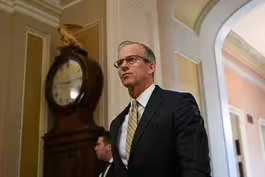
How old whaling logs help scientists track climate change
Clip: 4/5/2025 | 7m 29sVideo has Closed Captions
How 200-year-old whaling logs are helping scientists track climate change
What can centuries-old whaling ship logs tell us about today’s extreme weather? According to scientists, the answer is a lot. They’re using the information recorded by mariners going back hundreds of years to push the frontier of modern-day climate science. Special correspondent Pamela Watts with Rhode Island PBS reports.
Problems playing video? | Closed Captioning Feedback
Problems playing video? | Closed Captioning Feedback
Major corporate funding for the PBS News Hour is provided by BDO, BNSF, Consumer Cellular, American Cruise Lines, and Raymond James. Funding for the PBS NewsHour Weekend is provided by...

How old whaling logs help scientists track climate change
Clip: 4/5/2025 | 7m 29sVideo has Closed Captions
What can centuries-old whaling ship logs tell us about today’s extreme weather? According to scientists, the answer is a lot. They’re using the information recorded by mariners going back hundreds of years to push the frontier of modern-day climate science. Special correspondent Pamela Watts with Rhode Island PBS reports.
Problems playing video? | Closed Captioning Feedback
How to Watch PBS News Hour
PBS News Hour is available to stream on pbs.org and the free PBS App, available on iPhone, Apple TV, Android TV, Android smartphones, Amazon Fire TV, Amazon Fire Tablet, Roku, Samsung Smart TV, and Vizio.
Providing Support for PBS.org
Learn Moreabout PBS online sponsorshipJOHN YANG: What can centuries old whaling ship logs tell us about today's extreme weather?
According to scientists, quite a lot.
They're using the information recorded by mariners going back hundreds of years to push the frontier of modern day climate science.
Special correspondent Pamela Watts with Rhode Island PBS has our story.
PAMELA WATTS (voice-over): Observations of winds that once buffeted this 1800s whaling ship are offering up some critical clues to climate change.
The Charles W. Morgan is an attraction at Mystic Seaport Museum in Connecticut.
It's the last of an American fleet that once numbered close to 3,000 and the oldest wooden commercial whaling vessel still afloat.
Ship logbooks of its many whale hunting voyages, along with hundreds of others from New England, may provide a treasure island for researchers trying to learn more about extreme weather challenges.
TIMOTHY WALKER, Marine Historina: Oh, wow.
PAMELA WATTS (voice-over): The idea to take a deep dive into weather data from centuries old logbooks was launched by Timothy Walker, sailor, marine historian and professor at UMass Dartmouth.
TIMOTHY WALKER: These logbooks hold a lot of information about weather because the whalers were taking daily and multiple times a day they're writing down the winds and the temperatures and the wind direction and wind speed and so on.
And so we wanted to know if we could extract that weather data to inform climate science.
And it turns out that you can.
PAMELA WATTS (voice-over): Walker came to New Bedford, Massachusetts to crew on the historic schooner Ernestina.
One of his shipmates happened to be working on his PhD in Climate Ocean Science.
TIMOTHY WALKER: And he and I had talked about a way to do something with both of our skill sets.
PAMELA WATTS (voice-over): That discussion led to Walker fishing for weather information from the logs of local whaling ships and comparing it to the meteorology in the same coordinates today.
TIMOTHY WALKER: They're going to places where other ships don't go because merchant and military ships by the 1650s or so, they're following seaborne highways that they know is the most efficient way to get from place to place.
The whalers are following the whales who go to some of the most remote parts of the world's oceans.
And so they're recording weather data in places where we simply don't have any other way of knowing what the weather was like on a particular day at a particular place 150, 200, 250 years ago.
And this kind of information for climate scientists is absolutely priceless.
CAROLINE UMMENHOFER, Climate Scientist: These are the areas where we can pick up the different high pressure systems and how they are changing.
PAMELA WATTS (voice-over): Walker's voyage of discovery resulted in a collaboration with Woods Hole Oceanographic Institute on Cape Cod.
Scientist Caroline Ummenhofer says she was all aboard.
CAROLINE UMMENHOFER: when Tim reached out to me six years ago about this project, that there's maritime weather data contained in ship logbooks that seemed a real boon to trying to understand how wind patterns, how pressure patterns are shifting out over the oceans.
PAMELA WATTS (voice-over): Ummenhofer says her research is probing the ocean's role in climate variability and its effect on rainfall, droughts, flood and extreme weather events.
PAMELA WATTS: And how does this help us in dealing with climate change?
CAROLINE UMMENHOFER: We've analyzed 170 log books and we have over 100,000 daily weather entries, which is amazing, covering the period 1790 to 1910, with most of the data from the 1840s to 60s, which was the heyday of the New England whaling era.
We can compare that to modern day observations that we get from satellites or metrological stations.
It helps us put recent trends into a long term context.
For example, one area that we know has experienced large wind changes is the Southern Ocean.
PAMELA WATTS (voice-over): Ummenhofer says there is a strong belt of westerly winds which can carry storm systems that are churning around Antarctica.
The whalers called them the Roaring Forties.
They've shifted further south in recent decades and she says it's now more like the Furious 50s.
CAROLINE UMMENHOFER: It might sound strange, like what do we care about the winds over the Southern Ocean?
It's actually pretty important because rain bearing weather systems travel on these westerly winds.
And as these winds have shifted further south, they have left regions like southern Australia and southern Africa high and dry.
And they are experiencing much more frequent drought in recent decades than they have had in the past.
PAMELA WATTS: The Providence Public Library in Rhode Island has some 800 whaling ship log books in its special collections.
Second only to New Bedford, these were considered legal documents in their day.
Sailor carved ink stamps indicate how many whales were caught on a particular date and where.
The ledgers are filled with remarkable folk art illustrations of life on the years, long journeys, eyewitness accounts of mutinies, shipwrecks, mayhem and murder.
Walker says it's easy to become distracted by the drama.
While collecting the data, he notes, whalers harpooning the mammoth creatures were often pulled out to sea on what's known as a Nantucket sleigh ride.
There are also reports of tragedies in the treacherous waters as he read, in one gripping encounter.
TIMOTHY WALKER: Each whaling boat has five men.
So three boats went out to hunt whales.
A storm brewed up.
They lost those boats and they lost those men.
So they lost about a third of the entire crew in one storm.
PAMELA WATTS (voice-over): Yet the risk didn't deter the mariners.
Whale oil was profitable and essential for lamps and refueling machinery of the Industrial Revolution.
TIMOTHY WALKER: This is nice.
It says bound around Cape Horn, which sounds like a sea shanty.
And it is.
PAMELA WATTS (voice-over): While the whaling logs, usually written by the first or second mate, are often digitized, archival researchers have to go online to decipher the old cursive handwriting detailing weather observations and locations.
While Walker says he enjoys the history captured in the logbooks, he now has his sights set on the science.
TIMOTHY WALKER: As a historian, it's rare that you get a chance to do something that's so topically important and so, you know, vital to survival as a species, to our learning to grapple with climate challenges today?
PAMELA WATTS: Is there any way that you see that this research is ultimately going to help communities prepare for extreme weather?
CAROLINE UMMENHOFER: As we have a better sense of how storms and in particular, wind patterns that are associated with extreme events, how they have changed in the past, that gives us more confidence into how they are going to change in the future.
TIMOTHY WALKER: We can point to data and we can speak to climate skeptics and say, yes, this is really happening and we have to inform ourselves so that we're in a better position to react to a changing climate.
And that's another goal of our project, is to be able to provide the tools for public policy for homeowners along the coast to be able to deal with what's coming along the path in the 21st century regarding climate change and extreme weather events.
PAMELA WATTS (voice-over): For PBS News Weekend, I'm Pamela Watts in Providence, Rhode Island.
Are gummy vitamins as effective as vitamin pills?
Video has Closed Captions
Clip: 4/5/2025 | 5m 39s | Are gummy vitamins as effective as traditional vitamin pills? (5m 39s)
News Wrap: Senate pulls all-nighter to pass GOP budget bill
Video has Closed Captions
Clip: 4/5/2025 | 3m 9s | News Wrap: Senate pulls all-nighter to pass Republican budget bill (3m 9s)
Protestors across the U.S. rally against Trump’s policies
Video has Closed Captions
Clip: 4/5/2025 | 7m 22s | Protestors join more than a thousand rallies across the U.S. against Trump’s policies (7m 22s)
Providing Support for PBS.org
Learn Moreabout PBS online sponsorship
- News and Public Affairs

FRONTLINE is investigative journalism that questions, explains and changes our world.

- News and Public Affairs

Amanpour and Company features conversations with leaders and decision makers.












Support for PBS provided by:
Major corporate funding for the PBS News Hour is provided by BDO, BNSF, Consumer Cellular, American Cruise Lines, and Raymond James. Funding for the PBS NewsHour Weekend is provided by...


